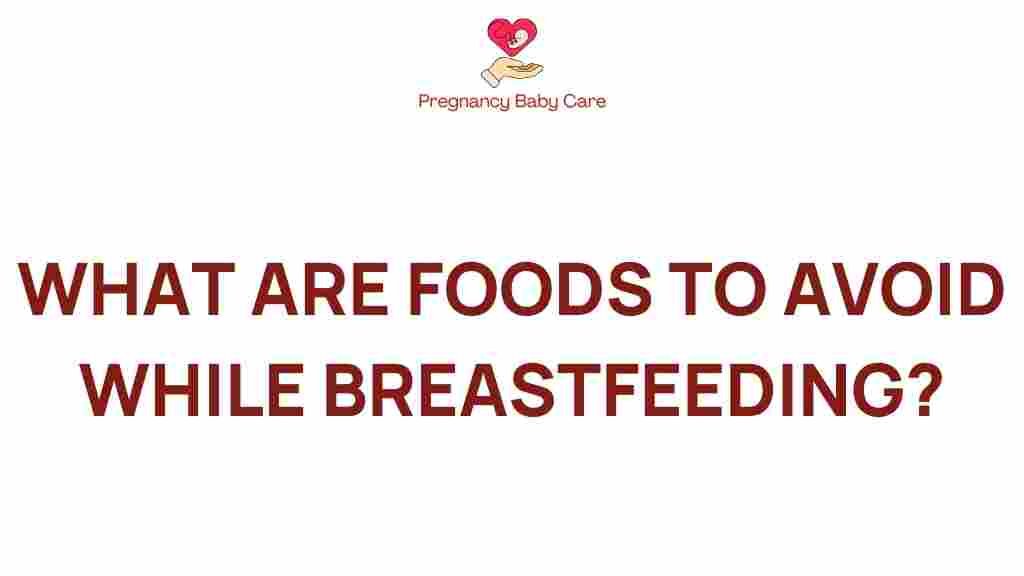Uncover the Foods to Avoid While Breastfeeding for Optimal Health
Breastfeeding is a beautiful journey that not only nourishes your baby but also strengthens the bond between mother and child. However, it’s essential for breastfeeding mothers to be mindful of their nutrition and the foods they consume. The right diet can significantly impact both maternal health and infant health. In this article, we will explore the foods to avoid while breastfeeding, ensuring that you provide the best nutrition for your baby while maintaining your own health.
Understanding the Importance of Nutrition During Lactation
During lactation, a mother’s diet plays a crucial role in producing high-quality breast milk. The right balance of nutrients supports both the mother’s well-being and the baby’s growth and development. However, certain foods can lead to discomfort or adverse reactions in infants. Here are some key reasons why maternal nutrition is vital:
- Boosting Milk Production: A well-balanced diet helps ensure adequate milk supply.
- Enhancing Milk Quality: Nutrient-rich foods contribute to the overall quality of breast milk.
- Supporting Maternal Health: Good nutrition helps mothers recover from childbirth and maintain energy levels.
- Mitigating Allergies: Avoiding certain foods can reduce the risk of allergic reactions in infants.
Foods to Avoid While Breastfeeding
While breastfeeding, some foods may not be suitable for mothers due to their potential effects on both maternal and infant health. Here’s a comprehensive list of foods to avoid:
1. Caffeine
Caffeine can be found in coffee, tea, chocolate, and some sodas. High caffeine intake may lead to irritability and sleep disturbances in infants. It’s advisable to limit caffeine to about 300 mg per day.
2. Alcohol
Alcohol can pass into breast milk and affect an infant’s development. It is recommended to avoid alcohol or consume it in moderation, allowing time for it to clear from your system before breastfeeding.
3. Fish High in Mercury
Certain fish, such as shark, swordfish, and king mackerel, contain high levels of mercury, which can harm an infant’s developing nervous system. Opt for low-mercury fish like salmon or sardines instead.
4. Spicy Foods
While some mothers can enjoy spicy foods without issue, others may find that their infants become fussy after they consume such meals. It’s best to pay attention to your baby’s reactions and adjust your diet accordingly.
5. Allergens
Common allergens such as peanuts, tree nuts, dairy, wheat, and soy can potentially cause allergic reactions in infants. If there is a family history of allergies, consider avoiding these foods while breastfeeding.
6. Processed Foods
Processed foods often contain unhealthy fats, added sugars, and preservatives that do not contribute positively to maternal health. Focus on whole, natural foods for optimal nutrition.
7. Gas-Inducing Foods
Foods like beans, broccoli, cabbage, and carbonated beverages can lead to gas and discomfort in breastfed infants. If your baby seems gassy or fussy, consider limiting these foods and monitoring the effects.
8. High-Sugar Foods
Foods that are high in sugar can lead to weight gain and other health issues for nursing mothers. It’s important to focus on healthy eating habits, emphasizing whole grains, fruits, and vegetables.
Healthy Eating Tips for Breastfeeding Mothers
Maintaining a nutritious diet while breastfeeding doesn’t have to be complicated. Here are some helpful tips:
- Hydrate: Drink plenty of water to stay hydrated, as fluid intake is vital for milk production.
- Eat Regularly: Have small, frequent meals throughout the day to sustain energy levels.
- Include a Variety of Foods: Aim for a well-rounded diet that includes fruits, vegetables, whole grains, healthy fats, and lean proteins.
- Consider Supplements: Talk to your healthcare provider about taking prenatal vitamins or other supplements to fill any nutritional gaps.
- Listen to Your Body: Pay attention to your body’s hunger and fullness cues, and eat accordingly.
Step-by-Step Guide to Adjusting Your Diet
Adapting your diet while breastfeeding can be a gradual process. Here’s a step-by-step guide to help you make necessary changes:
- Assess Your Current Diet: Keep a food diary for a week to identify the foods you consume regularly.
- Identify Problematic Foods: Reflect on how your diet may affect your baby’s behavior or health.
- Research Nutritious Alternatives: Look for healthy substitutes for foods you may need to eliminate.
- Make Gradual Changes: Start by removing one or two foods at a time and observe any changes in your baby’s health.
- Consult a Nutritionist: If needed, seek professional advice to create a balanced diet plan tailored to your needs.
Troubleshooting Common Issues
As you adjust your diet while breastfeeding, you may encounter some challenges. Here are some common issues and how to address them:
Issue 1: Baby’s Fussiness
If your baby seems fussy or gassy, try eliminating certain foods from your diet, such as dairy or spicy foods, and monitor their reactions.
Issue 2: Insufficient Milk Supply
If you notice a decrease in milk supply, ensure you’re consuming enough calories, staying hydrated, and incorporating lactogenic foods like oats and fenugreek.
Issue 3: Weight Gain Concerns
If you’re worried about postpartum weight gain, focus on whole foods and avoid processed snacks. Regular physical activity can also help manage weight.
Conclusion
Breastfeeding is an essential time for both maternal and infant health, and nutrition plays a pivotal role in this journey. By being aware of the foods to avoid while breastfeeding, mothers can make informed choices that benefit both themselves and their babies. Remember to focus on healthy eating, stay hydrated, and listen to your body’s needs. For more breastfeeding tips and support, consider visiting a lactation consultant or joining a local breastfeeding support group. Your commitment to optimal nutrition will pave the way for a healthier breastfeeding experience.
For additional resources on maternal health and breastfeeding, check out this informative article. You can also explore our nutrition tips for more insights on maintaining a balanced diet during lactation.
This article is in the category Feeding and created by PregnancyBabyCare Team
